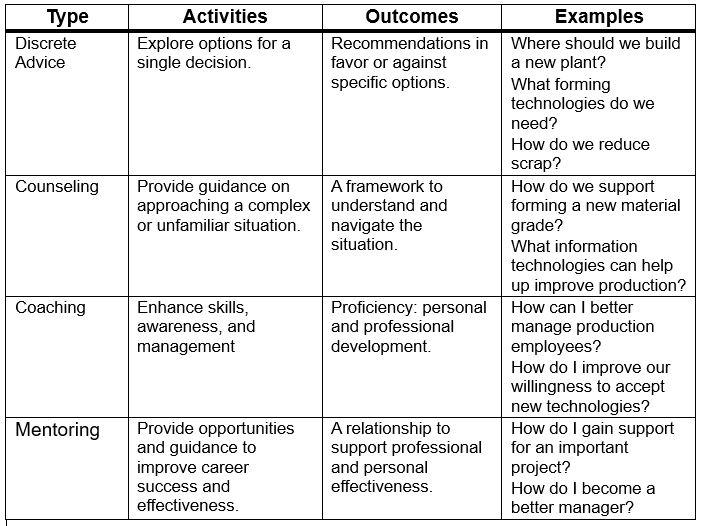President
- FMA
- The Fabricator
- FABTECH
- Canadian Metalworking
Categories
- Additive Manufacturing
- Aluminum Welding
- Arc Welding
- Assembly and Joining
- Automation and Robotics
- Bending and Forming
- Consumables
- Cutting and Weld Prep
- Electric Vehicles
- En Español
- Finishing
- Hydroforming
- Laser Cutting
- Laser Welding
- Machining
- Manufacturing Software
- Materials Handling
- Metals/Materials
- Oxyfuel Cutting
- Plasma Cutting
- Power Tools
- Punching and Other Holemaking
- Roll Forming
- Safety
- Sawing
- Shearing
- Shop Management
- Testing and Measuring
- Tube and Pipe Fabrication
- Tube and Pipe Production
- Waterjet Cutting
Industry Directory
Webcasts
Podcasts
FAB 40
Advertise
Subscribe
Account Login
Search
Seeking guidance in manufacturing's age of rapid change
How to find and accept the advice metalworkers need to make the best business decisions
- By Bill Frahm
- January 21, 2021
- Article
- Shop Management

It’s essential for metal fabricators and formers to find a trusted adviser to help analyze business and make smart decisions. Getty Images
The changes and developments that occur constantly in the sheet metal forming industry offer many opportunities. Companies willing to explore and accept challenges can advance and grow their businesses if they manage change intelligently. Those who fail to manage advances in technology and materials will lose access to the opportunities and expose themselves to the risks of either costly implementation mistakes or being left behind.
When our business environment gets complex, we often need guidance to help us make good decisions and manage for positive results. Honest guidance offers you the knowledge and confidence to pursue new clients and projects and to provide consistent-quality products to your customers.
This guidance comes in many forms. Mentors offer insights from their experiences. Customers offer insights too, though they frequently are unpleasant. Suppliers should offer customer service in the properties and use of their products. Consultants offer expertise in the disciplines they know. Professional organizations offer opportunities to share experiences and learn from colleagues.
Many sources are available to help you learn. Your challenge is to know you are learning the right things to accomplish your goals. This means that the subjects you learn apply to improving your results and that you are learning accurate and current knowledge.
Seeking advice is an important skill for managers, as they often encounter situations or changes that require good counsel to help them either improve operations or move ahead to adopt new processes and technologies. Taking the advice of others is an exercise in:
- Being an engaged listener
- Being honest about your organization, yourself, and your needs
- Patience
- Managing conflict
As you seek guidance, you need to be certain about what you hope to accomplish, select the right adviser and type of advice based on the needs of your organization (see Figure 1), and receive that advice with an open mind and open ears. Here are a few tips for seeking and accepting guidance successfully:
- Define what you want to accomplish. Any project needs a scope. Your scope is to focus your adviser on important issues you want repaired or the opportunities you want to be able to pursue.
- Decide your commitment to improvement. If you analyzed your goals and issues adequately, you should understand the value of new opportunities and the cost and risks of your inefficiencies. Understanding costs and opportunities allows you to set goals for budget, personnel, and time to prepare for opportunities and improve your operating results. Given this you can prioritize your needs for guidance and direct the advice you receive.
- Seek the right advisers. When looking for guidance, it’s valuable to accept opinions that push your comfort zone. It’s useful to have your own thoughts and ideas confirmed, but that won’t lead to growth. Seek people with different experiences. Bright young engineers and apprentices can offer you a fresh perspective from what they learned. Manufacturing and technology professionals from outside of the stamping industry won’t have the same biases long-term employees may have. Fresh eyes can often open your own eyes.
- Listen actively and intently. A guiding and consulting session shouldn’t be viewed as a concert, but as a jam session. Don’t just sit back and expect a show. Get involved. Ask questions. Dig deeper. Don’t be afraid to ask why. Find out what others experienced when using a recommended approach.
- Don’t be eager to dismiss advice. Sometimes ideas that challenge your beliefs and biases can lead to a successful solution. Understand that forming advanced high-strength steel, aluminum, or even high-strength low-alloy material is a different world than forming mild steel. The material behaviors are different. The technologies, hardware, lubricants, and production temperatures can be very different and require new ways of thinking. Remember, you are seeking guidance to help you learn and improve, not to tell you what you already know.
- Maintain your scope and boundaries. Advisers can sometimes be distracted by “shiny objects” outside the scope you’ve defined. Keep your project relevant to your own immediate needs and its implementation within your boundaries.
- Be honest and acknowledge failures and uncomfortable facts. When you decide to seek guidance, you want advice to help you perform better. This requires that you and your employees be honest with yourselves and with those you select for guidance. Understand and own both your strengths and weaknesses and be willing to admit where you need help. That’s the first step toward solving issues, assigning tasks to the right people, and getting past your insecurities.
- Put advice into action. You will learn that your organization has weak spots. Maybe production staff needs reinforcement on the fundamentals of material properties. Maybe maintenance workers need to be better at predictive maintenance. Maybe you’re inattentive to things like applying lubrication or keeping work areas clean and organized. So be ready to plan for implementation. Take and assign ownership to these issues and develop procedures to ensure production activities are efficient and focused on the right things.
- Seek additional guidance if necessary. Rarely does a review project solve all of your problems. Mentorship and advisory relationships should be ongoing. Over time, you will learn to better identify issues and develop a staff willing to address their own production weaknesses before they become business failures.
In an industry as increasingly complex as sheet metal forming, none of us can afford to stand alone. We are faced with new material grades, new forming technologies, new forming processes, and evolving information technologies. If your company wants to accept the challenge of forming today’s lightweight, high-strength materials, you must first reinforce your current knowledge, processes, and capabilities. With a solid foundation, you can pursue new knowledge, technologies, and processes to promote growth.
Where to Start: Professional Associations
When you are searching for advice and mentorship, professional associations are terrific resources, offering publications, training, classes, trade events, and networking opportunities with others in the industry. Metal manufacturers are served by several:
- Fabricators and Manufacturers Association Intl., www.fmamfg.org
- North American Deep Draw Research Association, naddrg.org
- Precision Metalforming Association, www.pma.org
- WorldSteel, www.worldsteel.org
- World Auto Steel, www.worldautosteel.org
- American Iron and Steel Institute, www.steel.org
- The Aluminum Association, www.aluminum.org
About the Author

Bill Frahm
P.O. Box 71191
Rochester Hills, MI 48307
248-506-5873
subscribe now

The Fabricator is North America's leading magazine for the metal forming and fabricating industry. The magazine delivers the news, technical articles, and case histories that enable fabricators to do their jobs more efficiently. The Fabricator has served the industry since 1970.
start your free subscription- Stay connected from anywhere

Easily access valuable industry resources now with full access to the digital edition of The Fabricator.

Easily access valuable industry resources now with full access to the digital edition of The Welder.

Easily access valuable industry resources now with full access to the digital edition of The Tube and Pipe Journal.
- Podcasting
- Podcast:
- The Fabricator Podcast
- Published:
- 04/16/2024
- Running Time:
- 63:29
In this episode of The Fabricator Podcast, Caleb Chamberlain, co-founder and CEO of OSH Cut, discusses his company’s...
- Trending Articles
Tips for creating sheet metal tubes with perforations

Supporting the metal fabricating industry through FMA

JM Steel triples capacity for solar energy projects at Pennsylvania facility

Are two heads better than one in fiber laser cutting?

Fabricating favorite childhood memories

- Industry Events
16th Annual Safety Conference
- April 30 - May 1, 2024
- Elgin,
Pipe and Tube Conference
- May 21 - 22, 2024
- Omaha, NE
World-Class Roll Forming Workshop
- June 5 - 6, 2024
- Louisville, KY
Advanced Laser Application Workshop
- June 25 - 27, 2024
- Novi, MI



























